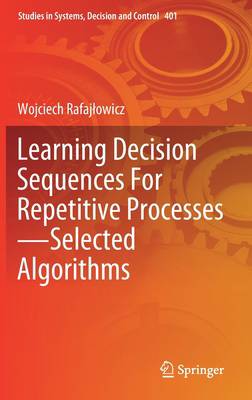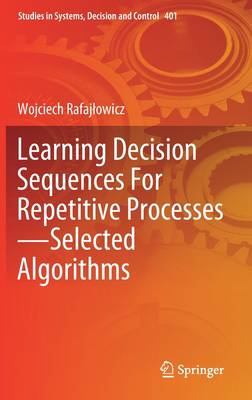
- Afhalen na 1 uur in een winkel met voorraad
- Gratis thuislevering in België vanaf € 30
- Ruim aanbod met 7 miljoen producten
- Afhalen na 1 uur in een winkel met voorraad
- Gratis thuislevering in België vanaf € 30
- Ruim aanbod met 7 miljoen producten
Zoeken
Learning Decision Sequences for Repetitive Processes--Selected Algorithms
Wojciech Rafajlowicz
€ 147,95
+ 295 punten
Uitvoering
Omschrijving
This book provides tools and algorithms for solving a wide class of optimization tasks by learning from their repetitions. A unified framework is provided for learning algorithms that are based on the stochastic gradient (a golden standard in learning), including random simultaneous perturbations and the response surface the methodology. Original algorithms include model-free learning of short decision sequences as well as long sequences-relying on model-supported gradient estimation. Learning is based on whole sequences of a process observation that are either vectors or images. This methodology is applicable to repetitive processes, covering a wide range from (additive) manufacturing to decision making for COVID-19 waves mitigation. A distinctive feature of the algorithms is learning between repetitions-this idea extends the paradigms of iterative learning and run-to-run control. The main ideas can be extended to other decision learning tasks, not included in this book. The text is written in a comprehensible way with the emphasis on a user-friendly presentation of the algorithms, their explanations, and recommendations on how to select them. The book is expected to be of interest to researchers, Ph.D., and graduate students in computer science and engineering, operations research, decision making, and those working on the iterative learning control.
Specificaties
Betrokkenen
- Auteur(s):
- Uitgeverij:
Inhoud
- Aantal bladzijden:
- 126
- Taal:
- Engels
- Reeks:
- Reeksnummer:
- nr. 401
Eigenschappen
- Productcode (EAN):
- 9783030883959
- Verschijningsdatum:
- 26/10/2021
- Uitvoering:
- Hardcover
- Formaat:
- Genaaid
- Afmetingen:
- 156 mm x 234 mm
- Gewicht:
- 376 g

Alleen bij Standaard Boekhandel
+ 295 punten op je klantenkaart van Standaard Boekhandel
Beoordelingen
We publiceren alleen reviews die voldoen aan de voorwaarden voor reviews. Bekijk onze voorwaarden voor reviews.











